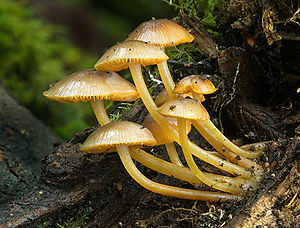Mycology
Mycology is the branch of biology concerned with the study of fungi, including their taxonomy, genetics, biochemical properties, and use by humans.For example, the cosmopolitan genus Fusarium and their toxins associated with fatal outbreaks of alimentary toxic aleukia in humans were extensively studied by Abraham Z.Many fungi are able to break down complex organic biomolecules such as lignin, the more durable component of wood, and pollutants such as xenobiotics, petroleum, and polycyclic aromatic hydrocarbons.For example, species of the filamentous fungal genus Trichoderma are considered one of the most important biological control agents as an alternative to chemical-based products for effective crop diseases management.[14] Fungi and truffles are neither herbs, nor roots, nor flowers, nor seeds, but merely the superfluous moisture or earth, of trees, or rotten wood, and of other rotting things.[25] Although mycology was historically considered a branch of botany, the 1969 discovery[28] of fungi's close evolutionary relationship to animals resulted in the study's reclassification as an independent field.The cultivation of forested ecosystems to produce this amount of usable wood is highly dependent on the mycorrhizal symbiotic relationships between plants, specifically trees, and fungi.This problem has increased over the years as the usage of monocultures have become more prevalent: a limited variety of plants in one area can lead to the rapid spread of specific pathogens.[40][41] Another devastating fungal pathogen is Sarocladium oryzae, which is a type of sheath rot fungus prevalent in India and is a great threat to rice cultivation.[42] Historically, one of the more well-known cases of plant-fungal pandemics was the potato blight of Ireland, which was caused by a water mold known as Phytophthora infestans.

Mycena leaianaMushroomMount Field National ParkBiologyOutlineGlossaryHistorytimelineCell theoryEcosystemEvolution PhylogenyAdaptation Energy processingGrowthRegulationReproductionResponse to environment DomainsKingdomsArchaeaBacteriaEukaryaAnimalsPlantsProtistsAbiogenesisAerobiologyAgronomyAgrostologyAnatomyAstrobiologyBacteriologyBiochemistryBiogeographyBiogeologyBioinformaticsBiological engineeringBiomechanicsBiophysicsBiosemioticsBiostatisticsBiotechnologyBotanyCell biologyCellular microbiologyChemical biologyChronobiologyCognitive biologyComputational biologyConservation biologyCryobiologyCytogeneticsDendrologyDevelopmental biologyEcological geneticsEcologyEmbryologyEpidemiologyEpigeneticsEvolutionary biologyFreshwater biologyGenerative biologyGeneticsGenomicsGeobiologyGerontologyHerpetologyHistologyHuman biologyIchthyologyImmunologyLipidologyMammalogyMarine biologyMathematical biologyMicrobiologyMolecular biologyNeontologyNeuroscienceNutritionOrnithologyOsteologyPaleontologyParasitologyPathologyPharmacologyPhotobiologyPhycologyPhylogeneticsPhysiologyPomologyPrimatologyProteomicsProtistologyQuantum biologyRelational biologyReproductive biologySociobiologyStructural biologySynthetic biologySystematicsSystems biologyTaxonomyTeratologyToxicologyVirologyVirophysicsXenobiologyZoologyBiologistList of biology awardsList of journalsList of research methodsList of unsolved problemsAgricultural scienceBiomedical sciencesHealth technology Pharmingbiochemicaluse by humanstindertraditional medicineentheogenspoisoninfection